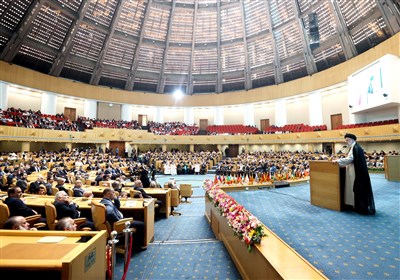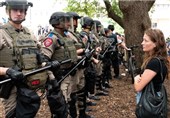French Police ‘Use Beatings, Tear Gas, Confiscation’ against Calais Refugees
TEHRAN (Tasnim) - Police violence towards refugees in Calais has intensified to “excessive and life-threatening” levels, according to a new report, and the overall situation for unaccompanied minors has deteriorated markedly, a year after the refugee camp there was razed.
The report by the Refugee Rights Data Project (RRDP) says French police tactics against the estimated 700 refugees at the port are alleged to have included driving unaccompanied girls to remote spots and abandoning them. Researchers used interpreters to interview 233 refugees, including 94 children as young as 12, and found repeated “disproportionate and indiscriminate” accounts of police brutality including beatings severe enough to break limbs.
The RRDP report, to be published on Monday, says French and British authorities have effectively abandoned them and a lack of protection has allowed recurrent and gratuitous attacks from local racists as well as police, the Guardian reported.
Several hundred child refugees are in the Calais area, many of them believed to be eligible for entry to the UK. Of the unaccompanied minors questioned by RRDP researchers, many sleeping rough in forests or fields around Calais, 40% said they had family in the UK.
The high-profile destruction of the so-called Jungle camp in Calais a year ago was meant to stop the accumulation of refugees hoping to start a new life in the UK by dispersing its inhabitants across France. Yet the port is still a magnet for many despite a “hostile and violent environment” that the report says manifests itself in a failure to ensure refugees have access to food, water and other basic needs.
Researchers also documented numerous accounts of police targeting individuals with pepper spray as they slept, and confiscating blankets and even shoes.
RRDP founder Marta Welander said: “The current state approach of police brutality and intimidation does little to resolve the unsustainable situation.”
Of those questioned, nine in 10 said they did not feel safe, and the same proportion said they had experienced police violence, compared with 75% of respondents during clashes last year.
A 16-year-old Eritrean told researchers of a baton attack so sustained he thought the victim would be killed: “I didn’t think he would survive: the kid didn’t look physically strong.”
The report says: “A number of accounts appear to suggest that police violence … sometimes takes disproportionate and life-threatening forms.”
In another account, a 17-year-old Eritrean girl told how police detained her, then drove her to a remote location at 6pm, where they abandoned her to walk three hours back to Calais. She told researchers she felt scared as it was dark and she did not know the way.
The child refugees also told of 4am police raids which, according to them, always involved tear gas or pepper spray, with most saying their sleeping bags were sprayed to make them unusable. A 16-year-old boy from Afghanistan said: “They [the police] spray tear gas in my face. They take my blanket, sometimes my shoes, then they beat us with sticks and we run away.” Many reported having their shoes confiscated and having to run away barefoot in the wet and cold.
Another teenager from Afghanistan said the police had broken his leg and that he now suffered back problems.
Last Monday a report by the French administration and security forces’ internal investigations departments’ detailed evidence of excessive police force and abuses against refugees in Calais. Yet such reports have been rejected by authorities: Vincent Berton, the deputy prefect for Calais, dismissed them as “allegations, individuals’ declarations, not based on fact”.
The RRDP report says the situation is magnified by allegations of violence from local people, with 82.4% of refugees questioned reporting abuse including animal sounds and racial slurs. A 29-year-old Eritrean woman said: “On the road they always make monkey chants whenever they pass by.”
More than a third of respondents added that they had experienced physical violence, including bottles thrown from moving vehicles. A 20-year old man from Afghanistan said: “Once someone threw a flower pot at me.”
Several attempts to run into refugees with cars were also reported, with a 19-year-old from Eritrea saying some locals had deliberately tried to strike him with their car.






